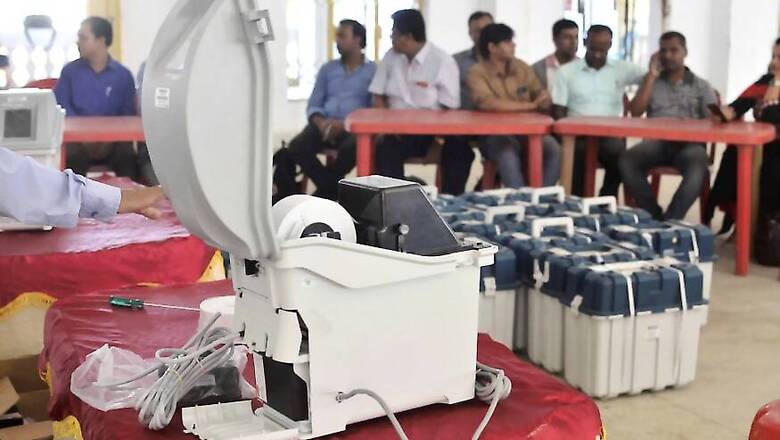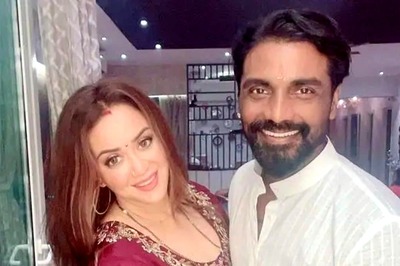
views
New Delhi: As India goes to vote in less than a month, it is not only the long queues of voters that would determine who wins the 17th Lok Sabha elections but also the postal ballots and the proxy voters.
In the last Lok Sabha elections, more than 40,000 of the 70,000 government employees on poll duty had cast their votes through postal ballot.
While the facility was earlier used only by staff in missions abroad and defence personnel in a limited way, the Election Commission of India decided to make use of the postal ballot in a big way for the 2013 Assembly elections.
The sixth Delhi Assembly elections also saw deployment of 55,000 personnel of the Delhi Police and 22 companies of central paramilitary forces. Officials said that in 2008, only around 1,000 votes were cast through postal ballot.
News18 answers some of the questions around this system:
1. Who can vote by postal ballot?
There are six different categories of voters entitled to use the postal ballot: service voters; special voters; wives of service voters and special voters; voters subjected to preventive detention; voters on election duty and Notified voters.
2. Who are the Service voters?
Service voters include the armed forces, those in a force covered by the Army Act, those in the armed police force of a state who are serving outside the state and those employed by the government of India and working in a post abroad (as embassy staff for example).
3. Who are the Special Voters?
Special voters are those holding offices that have been declared by the President to be offices to which sub-section (4) of Section 20 of the Representation of the People Act applies. Such offices include the President, the vice-president, governors of states and ministers of the Union or of states.
4. Who are the Notified Voters?
These are the voters who belong to a class of persons notified by the Election Commission (EC) in consultation with the government, are eligible for postal ballot.
5. But what about the family of the officers posted at remote stations?
Domestic servants accompanying diplomatic officers are not entitled to the postal ballot facility and nor are the sons and daughters of such officers.
6. How do you vote by Postal ballot?
In the case of service voters, their names are already registered in the last part of the electoral roll in each constituency. It is the responsibility of the returning officer of the constituency to ensure that the postal ballot papers are dispatched to these voters in time for them to return the papers for counting.
The EC's rules stipulate that the returning officer must get the ballot papers for service voters printed within 24 hours of the last hour of withdrawal of candidates for the poll. They must be dispatched within the next 24 hours. This is because the schedule allows for only 13 days between the date of withdrawal and the date of polling.
Therefore, enough time must be allowed for the ballot papers to be dispatched to all the eligible voters and for them to be filled and returned. Special voters who wish to use the postal ballot will have to apply to the returning officer at least 10 days before the date of polling, after which the returning officer must send him or her the ballot papers.
7. How does a voter in preventive detention vote?
For those in preventive detention, it is the duty of the government to inform the returning officer of their names, addresses and electoral roll numbers, along with the place where they are being kept in detention.
Voters on election duty have to apply for the postal ballot facility, normally at least seven days before the poll. However, the returning officer can use his discretion to allow people in this category to use the postal ballot even at short notice, since in some cases they may become aware of the fact that they will be unable to vote, too late to meet the seven-day deadline.
8. What is Proxy Voting?
Proxy voting allows a registered elector to delegate his voting rights to a representative he nominates. This was introduced in 2003 for very few countries to have such a provision. Notably, only “classified service voter” serving in the armed forces or paramilitary forces is allowed to avail of these benefits; the proxy, too, must be a registered voter of the same constituency.
The urgent necessity of proxy voting has been heavily discussed once again as the country goes to polls from April 11. Many (non-resident Indians) NRIs have been urging the government to grant them the right to cast proxy votes in the constituencies where they are registered.
Even the government tried to introduce proxy voting for a class through a bill, but it could not clear the parliamentary hurdle as the opposition stated that there was no mechanism to guarantee that the proxy voter will actually vote for the person the actual voter wants to see in power.

















Comments
0 comment